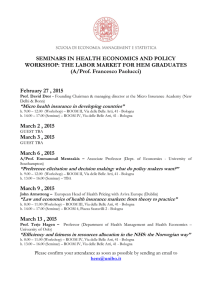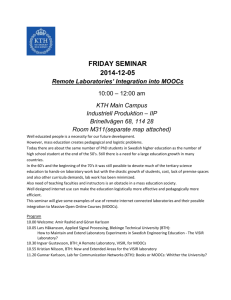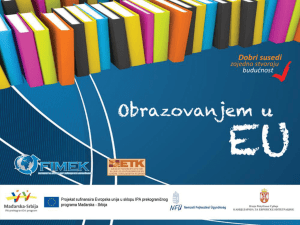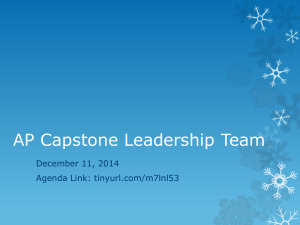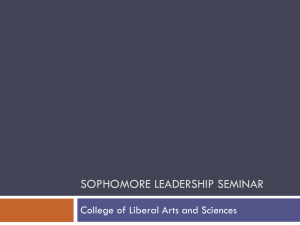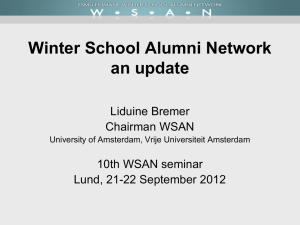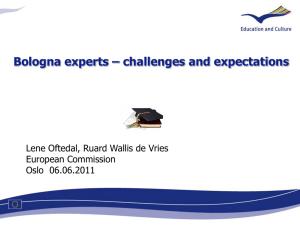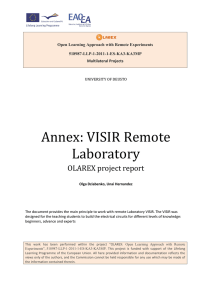ICT for learning
advertisement
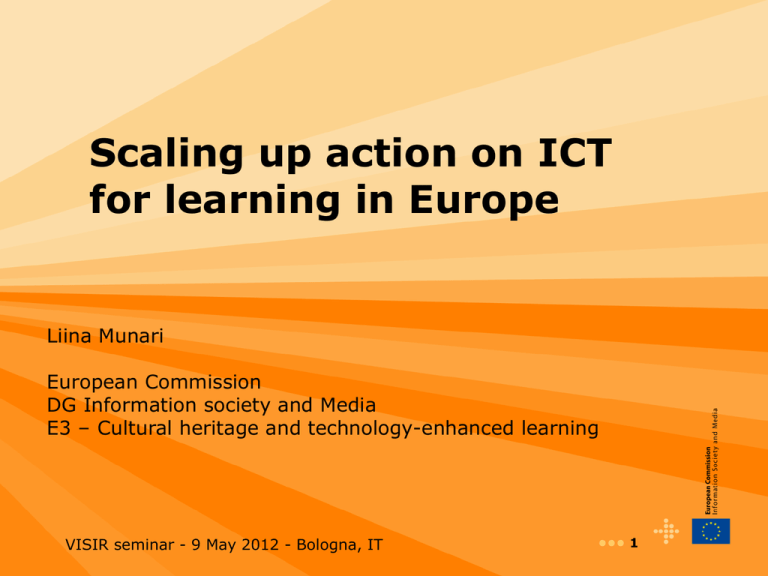
Scaling up action on ICT for learning in Europe Liina Munari European Commission DG Information society and Media E3 – Cultural heritage and technology-enhanced learning VISIR seminar - 9 May 2012 - Bologna, IT ••• 1 ICT for learning – for whom? • Formal education: formal institutional framework, primary/secondary schools, higher education, vocational education and training • Life-long learning: continuous building of skills and knowledge throughout the life of an individual, including training at workplace, couselling, tutoring, mentorship, apprenticeship, as well as informal activities such as self-paced learning, life-experience etc VISIR seminar - 9 May 2012 - Bologna, IT ••• 2 Commonalities? • Due to technological innovation and widespread availability: – Individualisation of learning – Richer experiences – Ubiquity of access to learning across subjects, ages, cultures, skills and systems • Emergence of clear patterns towards a global, open and ubiquitous concept of learning – inside and outside of the classroom VISIR seminar - 9 May 2012 - Bologna, IT ••• 3 Specificities? • Both sectors have their specificities and distinct stakeholders • Targeted way of addressing • No « one–size-fits all » solution VISIR seminar - 9 May 2012 - Bologna, IT ••• 4 Challenges? • Methods • Content • Technologies VISIR seminar - 9 May 2012 - Bologna, IT ••• 5 Challenges: Education • Methods: ensure universal access to efficient and high quality education (including assessment), financing the wide deployment of ICT solutions • Content: Immature fragmented markets, language barriers, US dominance, availability of curriculum related, affordable and quality educational resources, deployment and take-up • Technology: EU players vs. US dominance, market immaturity, digital competences, maintenance, cost (devices, software, services) VISIR seminar - 9 May 2012 - Bologna, IT ••• 6 Challenges: Life-long learning • Methods: fast re-skilling / upskilling for jobs, efficiency and performance, perception of economic value of learning investments, digital divide and inclusion • Content: access to quality, affordable and personalised digital educational content, economy of scale, language barriers • Technology: quality, cost-effectiveness, integration with enterprise solutions, accessibility VISIR seminar - 9 May 2012 - Bologna, IT ••• 7 What could INFSO do? • Status quo? – Solid R&D baseline enabled technology progress and use for wider market uptake – Research and supply driven approach – New instruments (prizes, PCP) • BUT: – How to speed-up adoption by of institutional stakeholders – How to ensure engagement in the innovation process VISIR seminar - 9 May 2012 - Bologna, IT ••• 8 What could INFSO do? • Focus on schools? – Member States have started to integrate ICTs in the steering documents and practice – Acceleration of the modernisation process in partnership with institutional actors and technologists driven by a shared vision • BUT: – Commission has a limited mandate in education – Institutional change is slow VISIR seminar - 9 May 2012 - Bologna, IT ••• 9 What could INFSO do? • Focus on life-long learning? – Stimulate market development through a mix of demand and supply measures – Business productivity and competitiveness, and availability of an open, universal and low-cost access to learning for all – Piecemeal solutions could deliver many successes • BUT: – Large numbers of areas and stakeholders – The variety of needs to cover – Complexity of building smoothly on the Member States actions in various policy fields VISIR seminar - 9 May 2012 - Bologna, IT ••• 10 What could INFSO do? « Learning digitally, anytime, anywhere » – Mobilise the stakeholders and resources – Capitalise on recent and future technology and ecosystem progress – Support learning in continuum from schools to organisational and individual learning – Holistic learner-centred approach, engage directly with stakeholders, – Driven by technology and supply industry and wide potential user communities reinforcing and learning from each other and developing the necessary mindshare for change VISIR seminar - 9 May 2012 - Bologna, IT ••• 11 Key conditions for success: High-level political engagement and partnership Support through • Dialogue with key players and decision-makers (politicians, industry, visionaries) • Presence in key stakeholder platforms in Europe and beyond • Advisory group / Think Tank VISIR seminar - 9 May 2012 - Bologna, IT ••• 12 Key conditions for success: Research and development • Focus, prioritise, strengthen research in H2020, including new devices and concepts (eg tablets, cloud etc) • Roadmap with public and private stakeholders, including industry and end users, to pave way for better adoption VISIR seminar - 9 May 2012 - Bologna, IT ••• 13 Key conditions for success Innovation • Mobilise the entire range of EU innovation instruments in H2020 to support the European learning industry, incl inducement prize contests, access to finance, procurement of innovation • Regional pilots, hubs of excellence, « lighthouses » involving all stakeholders and sharing experience • Strategy for educational content together with the publishers VISIR seminar - 9 May 2012 - Bologna, IT ••• 14 Game changer? Watch this space!!! VISIR seminar - 9 May 2012 - Bologna, IT ••• 15 Where to find learning in the DG CONNECT? As of 1 July 2012: DG CONNECT Unit G4 « Youth, skills, accessibility » Head of Unit: Pat MANSON Deputy Head of Unit: Marco MARSELLA VISIR seminar - 9 May 2012 - Bologna, IT ••• 16 Thank you for your attention! liina-maria.munari@ec.europa.eu VISIR seminar - 9 May 2012 - Bologna, IT ••• 17

